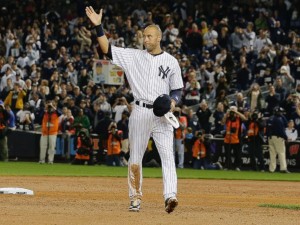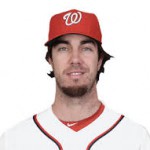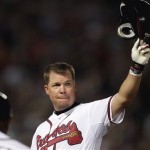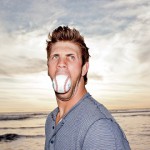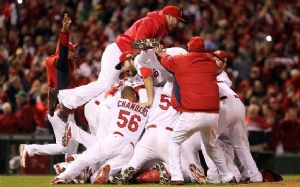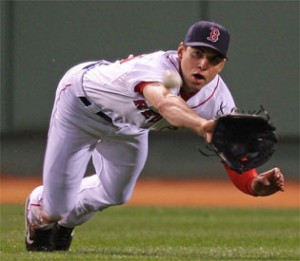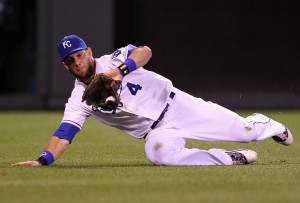
Alex Gordon was one of the best defensive players in baseball, by any measure in 2014. photo 365rundown.com
Last year, I created a little spreadsheet upon the announcement of the Gold Glove winners, to see how they compared to various defensive metric leaders (2013 xls link here). And I threw in the “Fielding Bible” award winners, since that has now taken over as the “accepted” list of the year’s best defensive players, thanks to the Gold Gloves continuing to pick inexplicable players (this year’s repeat “I cannot believe he won” player again being Adam Jones). But, as we’ve seen, the Gold Gloves are getting better, and the days of picking someone like a statue-esque Derek Jeter and/or a nearly permanent DH in Rafael Palmeiro seem to now be over.
So, now that we’ve announced the 2014 Gold Glove winners, lets also look at the league leaders in various defensive metrics.
This data is in the following spreadsheet for 2014 on Google Docs.
First, your 2014 Gold Glove winners: bold are also Fielding Bible winners, and red are the most egregiously bad selections.
| Pos | AL GG Winner | NL GG Winner |
| C | Salvator Perez, CLE | Yadier Molina, STL |
| 1B | Eric Hosmer, KC | Adrian Gonzalez, LAD |
| 2B | Dustin Pedroia, BOS | DJ LeMahieu, COL |
| SS | J.J. Hardy, BAL | Andrelton Simmons, ATL |
| 3B | Kyle Seager, SEA | Nolan Arenado, COL |
| LF | Alex Gordon, KC | Christian Yelich, MIA |
| CF | Adam Jones, BAL | Juan Lagares, NYM |
| RF | Nick Markakis, BAL | Jason Heyward, ATL |
| P | Dallas Keuchel, HOU | Zack Greinke, LAD |
As with last year, the league still remains obsessed with Adam Jones despite his possessing negative defensive rankings across the board. Kyle Seager wasn’t “bad” but wasn’t nearly as deserving as Josh Donaldson. The only other real “bad” selection was Molina, not because he’s not a great defensive catcher (he is), but because he missed a ton of time and there were better options in the NL this year (namely, Jonathan Lucroy). Otherwise every Gold Glove winner listed here was deserving.
Repeat Gold Glove winners from last year: Molina, Hosmer, Pedroia, Hardy, Simmons, Arenado, Gordon, and Jones. So, 8 of 18.
Here’s the 2014 Fielding Bible Awards, which (if you’re not aware) is a Bill James-driven website that uses a committee of national writers to select the winners (the site is here and you can read about their methodology). Bolded are also GG winners:
| Pos | 2014 Fielding Bible Winner |
| C | Jonathan Lucroy, MIL |
| 1B | Adrian Gonzalez, LAD |
| 2B | Dustin Pedroia, BOS (repeat) |
| SS | Andrelton Simmons, ATL (repeat) |
| 3B | Josh Donaldson, OAK |
| LF | Alex Gordon, KC (repeat) |
| CF | Juan Lagares, NYM |
| RF | Jason Heyward, ATL |
| P | Dallas Keuchel, HOU |
| Util | Lorenzo Cain, KC |
They selected Lucroy over Molina, and Donaldson over Seager. They’ve also added a 10th position for “Utility,” to recognize the excellent work of Lorenzo Cain playing multiple outfield positions.
Now, here’s the league leaders by various defensive stats. The links to get any of these leaderboards are in the Google xls. First: UZR/150.
| Pos | AL UZR/150 | NL UZR/150 |
| C | ||
| 1B | Albert Pujols, LAA (9.3) | Anthony Rizzo, CHC (8.2) |
| 2B | Dustin Pedroia, BOS (20.4) | DJ LeMahieu, COL (11.0) |
| SS | J.J. Hardy, BAL (15.4) | Andrelton Simmons, ATL (18.4) |
| 3B | Josh Donaldson, OAK (13.3) | Todd Frazier, CIN (8.9) |
| LF | Alex Gordon, KC (22.6) | Christian Yelich, MIA (14.1) |
| CF | Jackie Bradley JR, BOS (22.6) | Juan Lagares, NYM (25.3) |
| RF | Nori Aoki, KC (7.7) | Jason Heyward, ATL (20.5) |
| P |
I like UZR as a measure and use it often. UZR/150 somewhat standardizes the scores across a 150-game average to represent the figure for a full-season for apples-to-apples comparisons. A good number of these leaders also earned Gold Gloves and/or Fielding Bible awards. Josh Donaldson was the clear AL 3B leader. Otherwise there’s a lot of similarities to the lists we’ve already seen. I was surprised as heck to see Albert Pujols on this leader board.
For a quick point of reference to the above scores, the BEST UZR/150 of any Nationals player this year was Anthony Rendon‘s uZR/150 of 4.6 while playing 3B. Span and LaRoche (our two GG finalists) both scored *negative* UZR/150 scores … perhaps an indictment of their nominations in general as being based on reputation and not actual on-field performance this year.
Next: DRS; Defensive Runs Saved. Some like this stat a lot; I struggle with it because single plays (like an outfielder reaching over the wall to take away a homer) result in huge swings in the numbers on plays that aren’t necessarily the hardest to make.
| Pos | AL DRS | NL DRS |
| C | ||
| 1B | Chris Davis, BAL (8) | Adrian Gonzalez, LAD (12) |
| 2B | Ian Kinsler, DET (20) | DJ LeMahieu, COL (16) |
| SS | J.J. Hardy, BAL (10) | Andrelton Simmons, ATL (28) |
| 3B | Josh Donaldson, OAK (20) | Nolan Arenado, COL (16) |
| LF | Alex Gordon, KC (27) | Christian Yelich, MIA (13) |
| CF | Leonys Martin, TEX (15) | Juan Lagares, NYM (28) |
| RF | Kole Calhoun, LAA (2) | Jason Heyward, ATL (32) |
| P |
Dustin Pedroia had one of the highest UZR/150 ratings in the league … but he was not the top-rated 2nd baseman in the AL. We have our third different AL center fielder in three lists. Otherwise this is a pretty good list.
Next: FRAA: Fielding Runs Above Average, a Baseball Prospectus measure that attempts to remove the bias present in zone-based data and also tries to factor in the tendencies of the pitcher on the mound (ground-ball guy, fly-ball guy,
| Pos | AL FRAA | NL FRAA |
| C | ||
| 1B | Steve Pearce, BAL (7.7) | Adrian Gonzalez, LAD (11.4) |
| 2B | Jason Kipnis, CLE (9.5) | Chase Utley, PHI (6.9) |
| SS | Alexei Ramierez, CWS (8.1) | Jean Segura, MIL (23.6) |
| 3B | Kyle Seager, SEA (20.5) | Nolan Arenado, COL (14.3) |
| LF | Alex Gordon, KC (12.2) | Khris Davis, MIL (6.6) |
| CF | Jacoby Ellsbury, NYY (12.0) | Ender Inciarte, ARI (11.0) |
| RF | Kevin Kiermaier, TB (8.3) | Jason Heyward, ATL (26.4) |
| P | Dallas Keuchel, HOU (6.7) | Tyson Ross, SD (3.7) |
Interestingly, Jean Segura shines highly here (the supposed “best defensive player in the league” Andrelton Simmons only scored a 10.0 in FRAA). And this stat really favors the play of some random players: I had no idea who Kevin Kiermaier or Ender Inciarte were before doing this post, nor did I know what position they played.
Adam Jones scored a -8.1 FRAA; ranking him 1187th out of 1212 players for 2014. I’m not kidding. That’s how bad a selection for the Gold Glove Jones was.
Last stat: Baseball Reference’s Total Zone Fielding
| Pos | AL Total Zone Total Fielding | NL Total Zone Total Fielding |
| C | Salvator Perez, CLE (12) | Wilson Ramos, WAS (8) |
| 1B | Steve Pearce, BAL (13) | Justin Morneau, COL (11) |
| 2B | Jonathan Schoop, BAL (16) | Anthony Rendon, WAS (12) |
| SS | J.J. Hardy, BAL (14) | Jordy Mercer, PIT (21) |
| 3B | Kyle Seager, SEA (23) | Chase Headley, SD/NYY (18) |
| LF | Alex Gordon, KC (25) | Khris Davis, MIL (13) |
| CF | Lorenzo Cain, KC (18) | Billy Hamilton, CIN (14) |
| RF | Kevin Kiermaier, TB (12) | Jason Heyward, ATL (30) |
| P |
Check it out: our own Wilson Ramos is on this list as the “leader” for the NL. Which, no offense to Ramos, makes you question at least the catcher rankings for this stat. Rendon also factors in for his partial season at 2B. But overall, this seems like the least reliable defensive stat.
As mentioned above, both our GG finalists (LaRoche and Span) seem to have been nominated on reputation only; neither of them appeared near the top on any of these statistical measures (unlike last year, when Span at least was a leader in Total Zone)
Did I miss any good defensive metrics? Do you have one you like more or less than these? I know there’s other stats out there; I can update this analysis with more of them.
So, how did the Gold Gloves do this year in selecting the most deserving winners? Pretty good. Alex Gordon was the AL leader for left fielders in every stat. I think they picked the two correct short stops. Catchers are difficult to measure. They absolutely screwed up the AL Center fielder (though to be fair; there were four statistical measures presented and four different AL center field leaders. Excellent defensive players who jump around (Lorenzo Cain, Ben Zobrist) make the awards somewhat challenging in some cases.
